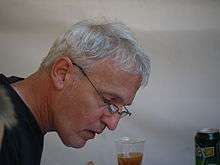Jean-Pierre Gibrat
| Jean Pierre Gibrat | |
|---|---|
 Jean Pierre Gibrat at 2009 edition of the Comic Strip Festival of Sollies Ville in France. | |
| Born |
Jean Pierre Gibrat April 14, 1954 Paris, France |
| Nationality | French |
| Area(s) | Artist, Writer |
Notable works |
Le Sursis Le Vol du corbeau Mattéo |
Jean-Pierre Gibrat is a French comic artist and scriptwriter.[1]
Born on 14 April 1954 in Paris, France. His first complete stories were published in the French magazine Pilote. With Jackie Berroyer, he took on le petit Goudard in 1978, a series which he continued in the same year in Charlie Mensuel, then in Fluide Glacial in 1980. During this time, some of his artwork was also published in the press : l'Evénement du jeudi, le Nouvel Obs, Sciences et Avenir and he also produced work for Okapi and Je bouquine. In late 1982, he pencilled La Parisienne in Pilote, again on a script by Berroyer. In 1985, on Saval's texts, Gibrat drew, in Télé Poche, l'Empire sous la mer, an adventure starring the canine character Zaza, created by Dany Saval and Michel Drucker.
In October 1997, the graphic novel Le sursis was released, followed by volume 2 in September 1999, Le vol du Corbeau in 2002 and its second volume in 2005; all of which were published by Dupuis.
Works
- With Jackie Berroyer :
- Le Petit Goudard in 1978
- Visions futées in 1980
- C'est bien du Goudard in 1981
- la Parisienne in 1983
- Goudard et la parisienne in 1985
- With Dany Saval
- Les Aventures de Zaza in 1985
- Goudard a de la chance in 1985
- Mission en Afrique in 1988, with Guy Vidal ;
- Mission en Thaïlande in 1991 ;
- Mission au Guatémala in 1994 with Dominique Leguillier ;
- Narcisse Mullot in 1994 with Jean-Claude Forest ;
- Pinocchia in 1995 with Francis Leroi ;
- Marée basse in 1996 with Daniel Pecqueur ;
- Le Sursis :
- Volume 1, 1997
- Volume 2, 1999
- Le Vol du corbeau:
- Volume 1, 2002
- Volume 2, 2005
- Les Gens Honnêtes volume 1, 2008
- Mattéo:
- Première époque (1914–1915), Futuropolis, 2008 - (Official selection of the Festival d'Angoulême 2009)
- Deuxième époque (1917–1918), Futuropolis, 2010
- Troisième époque (Août 1936), Futuropolis, 2014